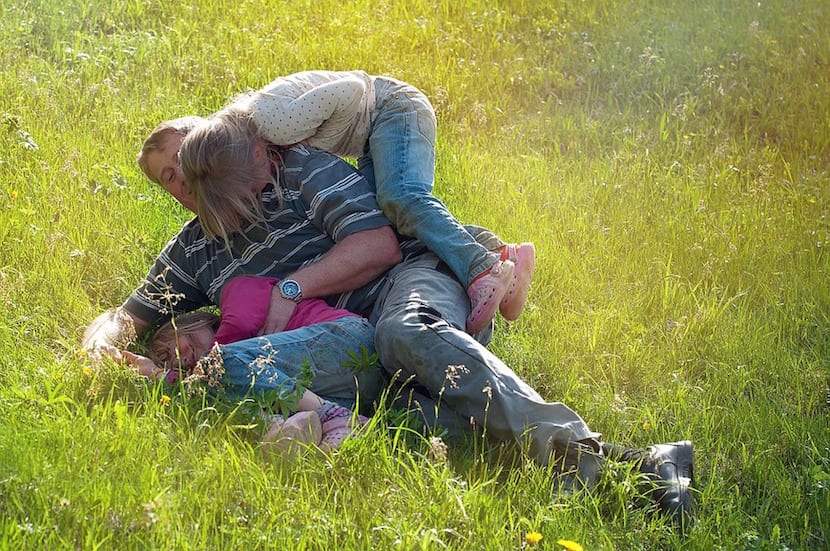
Parents often say things to their children that without realizing it are not the most appropriate to say to a child. Because they are inappropriate phrases or simply because instead of educating them you are generating considerable discomfort. On many occasions parents speak without thinking and end up saying things that can affect their children very negatively. Therefore, it is necessary to take into account some phrases that are better not to say.
If you think that you would never tell your children badly said things, perhaps it is because you have not yet taken a good look at everything you say. It's easy to turn to old-school wisdom or speak to children without thinking about what is being said at the time. But as parents, we need to start looking at what is being said, because each word shapes the thinking and personality of children.
Do not miss some phrases that you should avoid saying to your children from today.
1- Finish everything you have on your plate
In our society, eating everything on your plate is considered polite, but research has shown that this way of educating children is a very bad idea. Teaching a child not to listen to bodily signals when he is full and doesn't feel like eating anymore will make him associate eating a lot as a good thing. It goes without saying how counterproductive this is, as they could have eating problems in the future.

2- You need to diet
It does not matter that your child is overweight, never say the word 'diet', nor do you say it referring to yourself even if you want to lose weight. The ideal is to talk about learning to eat better or in a healthier way, but not, 'go on a diet' to 'be more handsome'. What's more, It is also not advisable that you share your anxiety about losing weight with your children.
The messages that are transmitted subliminally with these attitudes regarding your body image, children learn to feel body shame and this can lead to eating disorders. You need to start changing the conversation with yourself and with your children and focus on eating well to live a healthy lifestyle. So the whole family can be strong and fit.
3- You do it very well
It is very important to support and praise the children to motivate him, but if something did not do well, do not tell him otherwise, or to encourage him. If anything, tell him what he could do to improve that and guide him through the process. Children can tell when the truth is not being told and you are praising them dishonestly. Some may even feel like they need to try harder just to make their parents proud.
It is important that you focus on specific aspects such as; 'I have seen that you have tried a lot, next time you will do better', or, 'I noticed that you have played better than before, it seems that practice will help you a lot'. It is necessary that you be honest with your child from the respect and without belittling his work, because then, when you praise him, he will know that you are really doing it.

4- Behave like a girl (or a boy)
Gender stereotypes can start at a very young age. If you tell your children to act a certain way, you are telling them that they should settle for behaving that way because if not, it is not okay or they should feel guilty.
It is necessary that you understand the behavior of your children and that you do not tell them that they are 'more of a man' or that they 'behave like a young lady'. It is necessary to validate emotions regardless of whether it is a boy or a girl. For example; 'I know you feel nervous because it is your first day in this new school, but you will learn new things, you will meet other children and this is a great step, you can be brave in this'.
5- Don't tell dad (or: Don't tell mom)
Never under any circumstances make your children be accomplices of your bad behavior, nor do you teach them to keep secrets so that they do not tell the other parent. This can create uncertainty, anxiety, fear, guilt, division of loyalties ... Your child may think it's okay for other adults to ask him to keep a secret (with dire consequences). If you want to do something without your partner knowing, do it without your child being around.
If you are keeping a secret for good reason as a surprise birthday present, then it is okay to involve the children because they will be excited. In addition, in these cases it will also be important to explain to the children the difference between good secrets and bad secrets.

6- do not talk to strangers
Parents don't want children to talk to strangers because it can really be very dangerous as there are so many bad people out there. But this advice is full of controversy Because children will often have to talk to strangers, for example at school when a new teacher or classmate arrives, or at the supermarket etc.
Rather than sending this confusing message, children need to be taught to identify who is a dangerous stranger and who is not. This is by learning the strange behaviors that some adults can have. Explain to a child that if he gets lost, do not freeze for fear of strangers but go to safe places, like asking a police officer or a store or business with many workers to ask for help. You will have to stay with many people who can see you asking for help from the security guards, for example or a mother with children.
These are 6 phrases that you should stop saying to your children so that they can grow in a balanced way and also learn good ways to enhance ourselves with the world around them and feel safe. Do you say any of these phrases to your children?